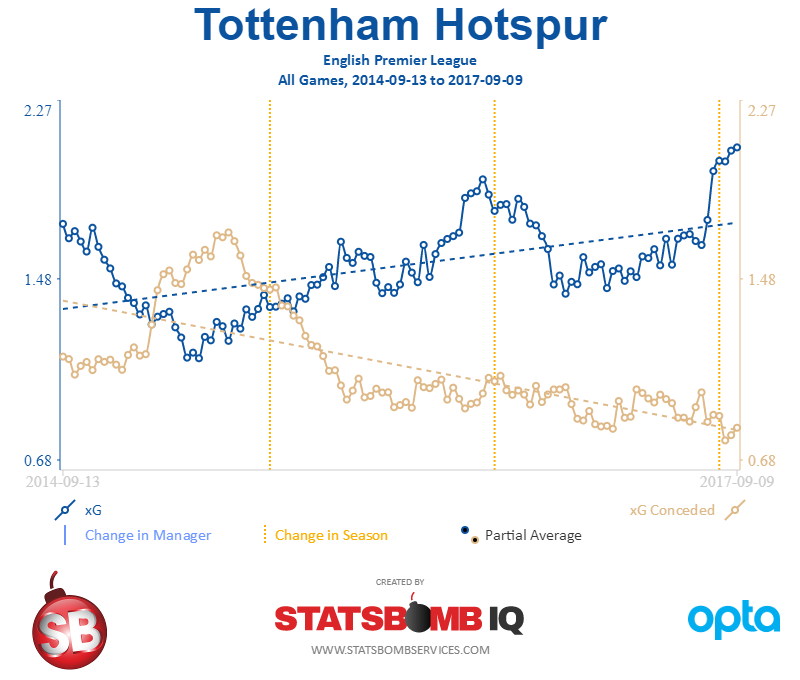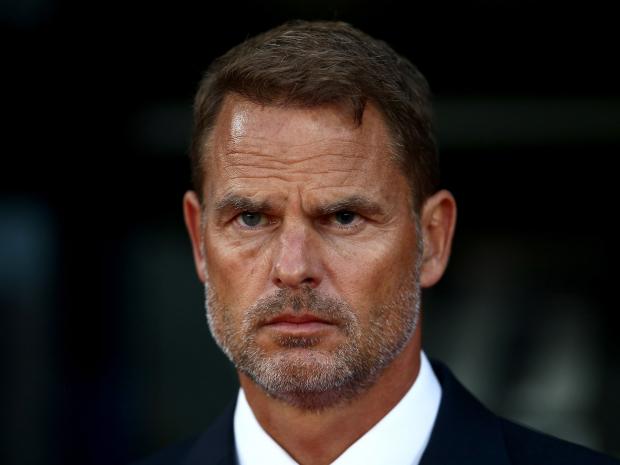Managerial recruitment is possibly the most important thing a football club does on a bi-annual basis. Hiring a poor manager or a bad fit can set off a chain of events that could see a club plummeting through multiple relegations. Hiring a good manager can take an average team and catapult them into title challengers.
However, at the club level managerial hiring is also the activity that might have the single most chaotic, backwards process of anything in football.
Here’s an example a friend of mine relayed to me a couple of years ago:
We got down to the final list of three candidates and something struck me as incredibly, almost impossibly strange…
I looked at the Sporting Director and I asked him, ‘Has anyone actually watched these teams play football?’
*crickets chirping*
No one had. Verifying that what these guys were telling them about their teams and what style they preferred them to play somehow wasn't part of the process.
What’s fascinating is that nowadays you can get video on almost any professional football team in the world. You can even find video down through U18s at a lot of top clubs that’s readily available online. Given the preponderance of potential evidence weighing in either for or against a candidate, not watching their teams actually play football is a baffling choice.
But my point earlier is that recruitment of managers and head coaches is filled with one baffling decision after another. Way more so than modern player recruitment. This is despite the fact that firing a manager and his staff costs millions to tens of millions in compensation costs, and can have serious knock-on effects for the club as a whole.
Because of this, today I want to discuss what teams are getting when they hire a new manager and why that matters.
What do you get when you hire a new manager?
- The Person
This seems obvious, but it’s often overlooked in the same way that footballer’s personalities are overlooked or brushed aside. This is the guy that sets the stage for every discussion you have within your club for the life of their contract. If they are closed off to new ideas, then that will have ripple effects for years. This is especially important to know for clubs that have undertaken a project to become more modern.
It sounds like a cliché, but man management matters. If you have a big squad to cope with things like European competition, you’ll have fringe players that are mostly there as cover in case someone gets injured. Some managers hate having big squads and that can cause huge issues if they aren’t also able to handle squad personalities well.
That said, sometimes a new manager is so good that you are willing to accept possible personality clashes in exchange for better performance. This is exactly the type of thing you really want to know ahead of time. What are the trade-offs we have to make when hiring this person and is it worth it?
Is your new coach a good teacher? A good communicator? A good leader? All of these things matter in general, but they become very important if you have a young squad, your club coaches need to learn their style to train academy players in, or if you have a lot of big personalities in the squad that need managing.
The person you are hiring deals with other people constantly. You really want to know before you hire them how that is likely to impact your club as a whole.
- Their Staff
This one can be strangely overlooked, but the staff that comes with a head coach can be very important in executing their style, and they can also fill certain roles your head coach as an individual might not be very good at (like man management, logistics, etc).
Here’s an example: some clubs allow new managers/head coaches to only bring two staff members with them when they join. The theory is that institutional knowledge inside the club is important and they want to maintain that, so instead of losing knowledge every time they have to change coaches, they limit potential change. This also forces the new coaching staff to communicate more with club staff as a whole, which generally should be seen as a good thing.
The problem here is that every coaching group is different. In some groups, the most important person after the head coach is the guy who does the fitness training. In others, you have explicit roles and subject matter expertise. (Like the head coach, an attacking coach, a defensive coach, a set pieces coach, the GK coach, etc.) Breaking that when you don’t have ready made roleplayers to fill the needs of the tactical style is a problem.
Finally, over the last few years we have heard of certain coaches waging war on their medical staffs. In some cases, having a trusted physio on staff is a hugely important dynamic because it means new managers get more comfort and clarity about player injuries and when they are likely to return to performance. In the high pressure world of football, a second trusted medical opinion for important players absolutely matters.
I generally agree with minimising change at clubs and at providing a good way for new managers to impart their knowledge to long-term club personnel. However, you need to be sensitive about breaking a whole that is greater than the sum of its parts.
- Their Style
This is perhaps the most important, obvious thing you get with football coaches but also the most misunderstood.
The common myth: Football coaches can change/learn new styles.
I covered this last year, explaining that how coaches learn is very different from how most of the population learns, and therefore it is difficult and time-consuming for them to take on new things. Expecting wholesale stylistic change is a near impossibility. Coaches can’t learn almost any of what they need to know about new tactical styles from books, so where is the information and execution coming from? Who is teaching it to them? What training sessions are they using to impart this knowledge to the players?
To be fair, some coaches are far more adaptable than others. Part of the education at Italy’s Coverciano is to learn to adapt your tactics and coaching to different requirements and not to be too married to one style. Italian coaches often seem more pragmatic and adaptable precisely because of how they are educated for their licenses. Most coaches can’t do that and expect any degree of success. On the other hand, plenty of people criticise Italian coaches for being too adaptable and too willing to change – the criticism cuts both ways.
So yeah, the vast majority of coaches are strongly married to whatever style they have displayed in the past and are unlikely to change much after you hire them, no matter how hard you wish it were otherwise.
With a particular style comes a whole host of other things including the most pressing and expensive concern: recruitment.
Tactical styles require players that fit the style. It’s easier if they also understand the style, but you need players with the right skill set for any chance of success.
The recruitment team needs to know the tactical style the coach wants to execute. Then they need to talk to the new manager and pull out specific role requirements for each position on the pitch and compare those needs to current playing staff. Once they do that, you can construct a recruitment plan based on the new requirements compared to squad weaknesses.
There is no generic football style. Different managers require different players. This is what makes changing managers regularly almost catastrophically expensive for clubs, especially if you let those managers also run recruitment.
Some tactical styles require pace and endurance at every position on the pitch. Size is a “nice to have,” but you will take a smaller, faster guy over a bigger one every time. Tony Pulis’s requirements are basically the opposite. Pace matters up front, but everywhere else you need beef.
Jurgen Klopp and Pep Guardiola’s teams both press. But their positional requirements for who they can recruit are almost surprisingly different.
Conclusion: Your recruitment team really needs to understand the style of play of your new manager in order to succeed.
Conclusion 2: If you do not recruit for your new manager’s style, you will fail. Especially if it differs significantly from the style that your team has played in the past.
The Case of Crystal Palace and Frank de Boer
In practical terms, the part about style circles immediately back to Crystal Palace’s situation this summer and the hiring of Frank de Boer.
As a manager, I think de Boer is actually pretty decent. He has proven he can coach a defense over the years, and though his attacking style is often regarded as boring, given the right players he has been successful. Palace hiring FDB was a bit of a risk, but also a decent shout if they wanted to raise the ceiling of the club. De Boer is perhaps not as good as hiring Marco Silva or Roger Schmidt might have been, but those guys went elsewhere, and Schmidt at least would have had even greater recruitment needs to succeed.
What de Boer also brings to the table is a very clear tactical style. His clubs are going to play a variation of Dutch/Ajax press and possess football. To pull this off, you need players who are understand how to execute this style, especially in the center of the pitch. And unlike the German zonal style, individual players probably have higher style-IQ requirements because it’s largely a man-marking system.
Right, so clear tactical style. Very unlikely to adapt it. Data analysis also shows zero indication he’s capable of tactical variation. Because of all this, you need to provide him players that can succeed and PROBABLY quite a bit of time to teach the team his system.
Remember, Pochettino’s first season at Spurs was bad defensively. He needed a year to imprint the learning on the squad and also multiple transfer windows to get players capable of playing the system at a high level.

So to support their new style that comes packaged with their new coach, Palace bought Jairo Riedewald (age 20), and loaned Timothy Fosu-Mensah(19) and Ruben Loftus-Cheek (20). They also added Mamadou Sakho on deadline day.
This is a complete and utter failure to recruit for the stylistic needs of a new manager/head coach. They also brought in Dougie Freedman as Sporting Director this summer, which was nearly as interesting/baffling as their recruitment when it comes to joining up style/head coach/club needs.
This is why clubs need to clearly understand the impact their choices on head coach/manager have on their future. If Palace weren’t going to do a lot of recruitment this summer because they didn’t have the budget, they should have gone a different direction with their coaching hire. Save the money you’re going to have to pay from sacking FDB and his staff in the first half of the season and use it in the next transfer window.
Hiring FDB and not recruiting for him is basically lighting money on fire.
To be fair to Palace, the squad as a whole is decent. There’s just this huge problem in that it doesn’t fit de Boer’s tactical needs at all. This is something every single football club needs to be aware of when making new managerial hires.
Later this week, I’ll discuss an improved process we've developed for coaching hires that delivers a better chance of immediate success and a brighter future.
